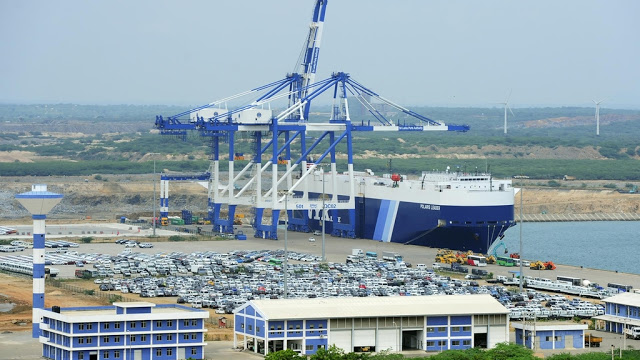Djibouti’s illegal seizure of Doraleh port is likely to make investors extremely wary . Courtesy DP World
Serious questions about its reliability as an investment destination are
surfacing following a court ruling that its seizure of a DP Word port
is illegal.
surfacing following a court ruling that its seizure of a DP Word port
is illegal.
It has been a trying few weeks for Ismaïl Omar Guelleh, president of
Djibouti, at a time when most other residents of the Horn of Africa are
celebrating emerging peace and, with it, the glimmer of prosperity.
Djibouti, at a time when most other residents of the Horn of Africa are
celebrating emerging peace and, with it, the glimmer of prosperity.
Two old enemies Eritrea and Ethiopia have ended 20 years of
bloodletting, and even the restive enclaves of Somalia appear ready to
reach across the table to former foes in the region. The war involving
Ethiopia cut off the landlocked country from Eritrea on the Red Sea
coast. As a consequence, 95 per cent of Ethiopian trade flowed through
Djibouti’s ports. The war’s end means Ethiopia has alternative port
options in Eritrea once again.
bloodletting, and even the restive enclaves of Somalia appear ready to
reach across the table to former foes in the region. The war involving
Ethiopia cut off the landlocked country from Eritrea on the Red Sea
coast. As a consequence, 95 per cent of Ethiopian trade flowed through
Djibouti’s ports. The war’s end means Ethiopia has alternative port
options in Eritrea once again.
Now, Djibouti has lost at the arbitral tribunal of the London Court
of International Arbitration, which ruled that the Djibouti government’s
seizure of control of Doraleh Container Terminal from DP World earlier
this year was illegal.
of International Arbitration, which ruled that the Djibouti government’s
seizure of control of Doraleh Container Terminal from DP World earlier
this year was illegal.
The finding was a blow to Djibouti, which is already dealing with
questions about its reliability as an investment destination following
the port grab.
questions about its reliability as an investment destination following
the port grab.
“Nationalist interventions in the economy, and weakening political
stability indicate that the current mirage of Djibouti’s investment
potential is overstated and unsustainable,” says Robert Besseling,
executive director of risk consultancy ExxAfrica.
stability indicate that the current mirage of Djibouti’s investment
potential is overstated and unsustainable,” says Robert Besseling,
executive director of risk consultancy ExxAfrica.
Just six months ago it all seemed so different. Apart from its
logistics hold over Ethiopia, the enclave located on the strategic Horn
of Africa was home to at least six foreign military bases that assured
both security and income.
logistics hold over Ethiopia, the enclave located on the strategic Horn
of Africa was home to at least six foreign military bases that assured
both security and income.
In addition, China was pouring in billions to build a new port and
free trade zone, making Djibouti an anchor of Beijing’s strategic “Belt
and Road” project. This would put Djibouti at the centre of a grand plan
to create a Chinese economic zone that spanned much of the globe.
free trade zone, making Djibouti an anchor of Beijing’s strategic “Belt
and Road” project. This would put Djibouti at the centre of a grand plan
to create a Chinese economic zone that spanned much of the globe.
“Many are dreaming of creating, with Chinese help, something similar to Singapore and the Gulf states,” German publication Spiegel gushed in a Djibouti spread, just last February.
With Eritrea now easing back into the international fold, and its
ports once again open to Ethiopia, Djibouti’s logistics value is less
certain. The seizing of the DP World’s port concession could not have
been worse timed.
ports once again open to Ethiopia, Djibouti’s logistics value is less
certain. The seizing of the DP World’s port concession could not have
been worse timed.
Now, potential investors had been put on notice that their capital
projects could be taken by Mr Guelleh’s government at any time, Mr
Besseling adds.
projects could be taken by Mr Guelleh’s government at any time, Mr
Besseling adds.
“Such interventions are likely to deter further foreign investment in
the services sector, while Djibouti’s natural resources are
negligible.”
the services sector, while Djibouti’s natural resources are
negligible.”
Meanwhile, Djibouti must figure out how to deal with the rapidly
growing pile of debt it owes Beijing. This is set to grow to around 88
per cent of the country’s overall GDP of $1.72 billion, according to a
report published in March by the Centre for Global Development, a US
non-profit based in Washington DC.
growing pile of debt it owes Beijing. This is set to grow to around 88
per cent of the country’s overall GDP of $1.72 billion, according to a
report published in March by the Centre for Global Development, a US
non-profit based in Washington DC.
It is hard not to see a looming similarity with Sri Lanka, which
racked up more than $8bn worth of debt to Chinese banks. Most of the
money was spent on Chinese contractors who built the Hambantota port, a
colossal white elephant as it turned out.
racked up more than $8bn worth of debt to Chinese banks. Most of the
money was spent on Chinese contractors who built the Hambantota port, a
colossal white elephant as it turned out.
Unable to service the debt, Sri Lanka this year signed over a 70 per
cent stake and a 99-year lease to Beijing, which includes 15,000 acres
of surrounding land. Perhaps the same fate awaits Djibouti, should it
find itself struggling to meet its debt to China.
cent stake and a 99-year lease to Beijing, which includes 15,000 acres
of surrounding land. Perhaps the same fate awaits Djibouti, should it
find itself struggling to meet its debt to China.





